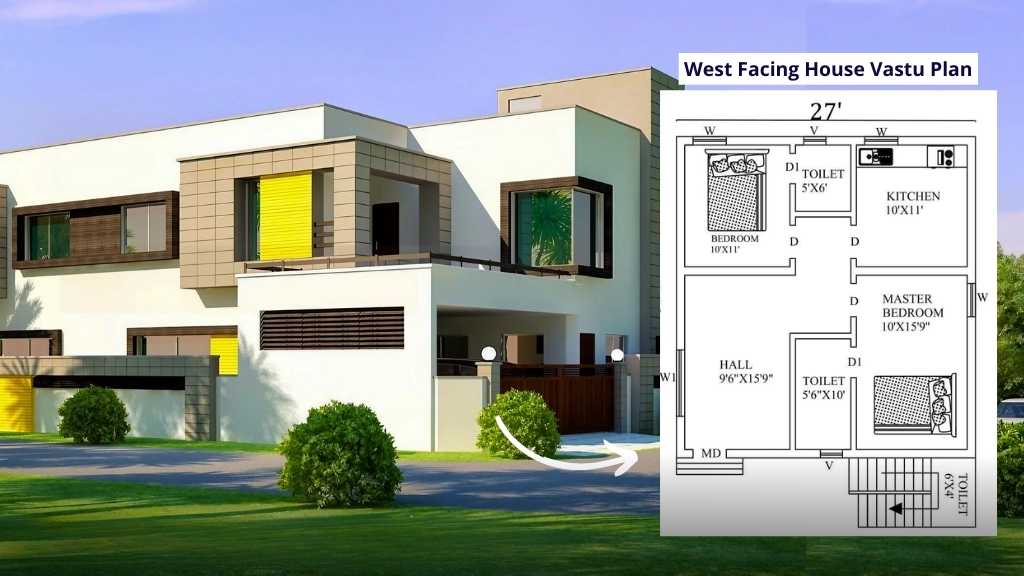
Creating Balance: Guidelines for West Facing House Vastu
People who want to buy a house also want to invite prosperity and harmony into their homes. While many favour east-facing houses for their perceived auspiciousness, west-facing properties are often dismissed due to misconceptions about bad luck.
However, Vastu experts assert that all directions hold equal potential for positivity and success. A west-facing house can prove favourable, especially for professionals like doctors, nurses, lawyers, artists, and teachers. Understanding the impact of a house’s orientation is crucial to making an informed decision about its energy flow. Here are a few essential west-facing house Vastu guidelines to consider.
But before that, let’s look at some west-facing house vastu benefits, shall we?
West Facing House Vastu Benefits
In Vastu, having a house facing west can bring in lots of warmth and those evening sun rays, which stick around for a while.
These west-facing homes are also considered pretty great for folks in business, politics, teaching, or religious leadership. Even young ones feel more energized in such places.
Lots of people believe that living in a house facing the West brings wealth and prosperity. Plus, there’s a perk of fewer opponents and gaining popularity in social circles.
Please Note: Consult with a knowledgeable Vastu expert to ensure that the house is optimized to support well-being and prosperity.
1. Importance of Entrance in a West-Facing House
In a west-facing house vastu plan, the entrance of a house is important as it’s where all positivity comes in. So, in a west-facing house, you have to design that main entrance door according to Vastu guidelines.
And hey, if you’re in a flat that faces west, make sure you pick the right colours for the doors too. For doors facing west and north, opt for softer shades like light blue. It’s all about keeping that positive energy flowing!
2. West Facing House Vastu Plan with Pooja Room and Living Room
For a west-facing house vastu plan with pooja room, Vastu suggests placing the pooja room and living room in the northeast corner, which is considered highly auspicious. However, you can also consider having the pooja room in the west, with gods’ idols facing east, similar to ancient temples in India. Alternatively, placing the gods in the east direction is also considered favourable. The key is to create a positive and harmonious environment in your home following Vastu principles.
3. Master Bedroom
According to west-facing house Vastu rules, the master bedroom is ideally placed in the south-west direction. In a multi-level house, the preferred location for the master bedroom is on the top floor. This arrangement is believed to enhance the relationship between couples and minimize conflicts. To ensure a peaceful environment and quality sleep, it’s essential to align the bed and various elements of nature in the room according to Vastu principles.
4. Living Room and Kitchen
If you choose the west-facing house vastu plan, the living room can be located in the east, north, northeast, or northwest directions of the house, and it is recommended to place furniture items in the southwest or west direction within the living room. When it comes to the kitchen, its correct placement is crucial for the health and prosperity of the family. Opt for the southeast corner for the kitchen and ensure the cooktop faces east during cooking. Avoid placing the kitchen directly over or under the bedroom, puja room, or toilet. The preferred zones for the kitchen are southeast or northwest, with the southeast corner being the best choice. Following these Vastu principles will create a harmonious and positive environment in your home.
5. Wall Colours
As per Vastu, the ideal colours for west-facing houses are white, silver, yellow, and beige. These neutral tones enhance positive energy from the West. If your house is more spread towards the west, consider using a light shade of blue to get more benefits from that direction. Off-white and cream are also good Vastu-neutral colours. Avoid using too many bright tones to maintain a balanced ambience in your west-facing home.
Do’s and Don’ts
- According to Vastu Shastra, the main door of a west-facing house should be placed in the Sugriva and Pushpdanta padas. It’s recommended to construct the walls in the south and west corners slightly thicker and higher than those on the east and north side.
- For a west-facing house, you can place the main door in the third or fourth padas, but avoid the seventh, eighth, or ninth padas.
- In a west-facing apartment, make sure the land plot is sloped from south to north. Avoid plots sloped from north to south, as they can lead to financial losses. Also, avoid plots with extensions in the southwest or south direction.
- Avoid properties with a slope from north to south direction, obstructions like trees in the main entrance, or thin walls in the south and west directions.
- Do not build a kitchen on the southwest side of the house and avoid sleeping under an overhead beam or wall partition.
- When sleeping, ensure that your legs do not point towards the door. Following these Vastu guidelines will create a positive and harmonious environment in your west-facing home.
So, is West Facing House Vastu Good or Bad?
In Vastu Shastra, there is no judgment of a house being “good” or “bad” solely based on its orientation, like west facing. The key lies in applying Vastu principles correctly to create a harmonious living space. By following Vastu guidelines for layout, construction, and interior design, the flow of energy within the house can be balanced, fostering a positive environment. A west-facing house can be just as beneficial as any other direction if Vastu principles are adhered to. So, if you are still wondering west facing house vastu good or bad, it just needs correct vastu principles.






